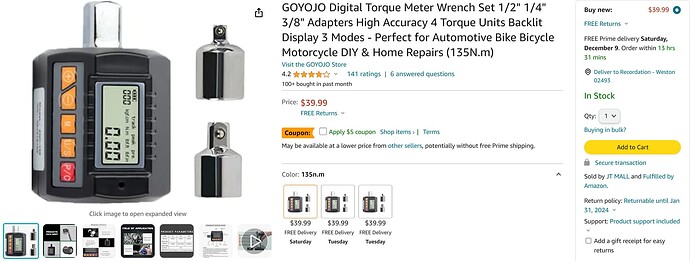Sure, what help do you need? How will it function? Calibration will be your main problem. Do you have reasonable shop where you can do the work?
Since torque = force x lever arm, an Arduino and strain gauge force sensor can be used to measure torque.
Example
Thanks Paul. I want to measure from 0-25 NM. I am not as concerned with the actual torque value, but it must be reproducible, such that applying a certain force will read a specific value. I am trying to make a device that can apply this torque but it will stop increasing torque when it reaches a certain magnitude.
I have a stepper motor that produces the torque through an adruino board, so now i want to focus on the torque.
thanks, rmemington, but the torque is generated through a stepper motor, so i need some device to read this.
Such a device is described on the web page I linked. It works for any type of motor.
Fine, but what is the design you want help with or do you want help in manufacturing the device?
i would be happy not reinventing the wheel. there seems to be mechanisms out there that will read torque between a motor and object through common socket wrench connections. Can I use the mechanism inside this twenty dollar tool in an arduino environment to capture the numbers? In other words, take the device apart, capture the output...
Possibly, if you have the time, tools and expertise to reverse engineer the innards.
i don't have the expertise. I was hoping someone here could show me how to make such a device...
Do you know the principle of operation of the device you want to make? Have you looked at how torque can be measured?
Yes. If i could place two strain gauges at 45 degrees along the shaft i could measure a torsional deformation proportional to the applied torque.
With a rigid metal as found in common tools and socet extensions, i am not sure if the voltage would be measurable.
I am willing to experiment!
Sparkfun offers very good tutorials on mounting and using strain gauges and/or load cells, and they sell a decent Arduino-compatible amplifier board.
For mounting naked strain gauges on shafts and beams, tutorials are available on line from the companies that sell them.
If I understand your application, putting strain gauges on a rotating shaft would require using slip rings or such to get the power and signals to/from the gauges. To use a system similar to the one @jremington linked you could mount the stepper motor on a base that could rotate about the shaft axis and attach an arm to the base that would press against the load cell.
Edit: Like this
The shaft is NOT rotating, only flexing. I much prefer my antique torque wrenches.
Search for one with a digital interface (UART, SPI, I2C...) to connect it directly to an Arduino.
Sorry, I thought OP said it was a stepper motor which in my mind the shaft rotates.
I think the OP is confused about torque wrenches and torque from a motor. Can't seem to get clarification. First picture posted was a fancy electronic torque wrench indicator.
I think OP was thinking they could use the guts of the digital torque wrench to solve their problem. Probably would work but as @DrDiettrich has alluded, it would require reverse engineering the interface.
The difference between static torque and rotational torque. Measured in TOTALLY different means. Some study in fundamentals is required!

